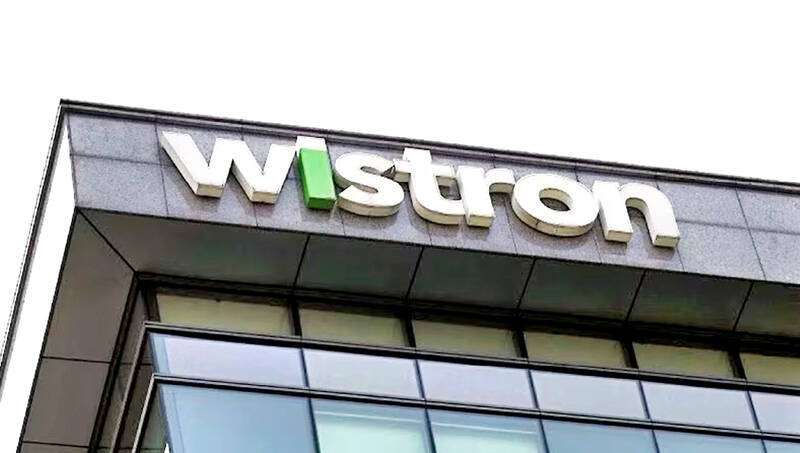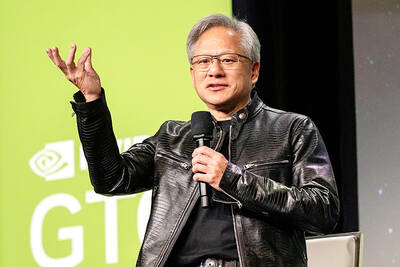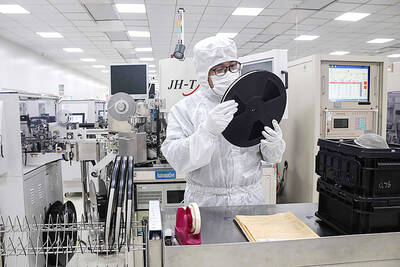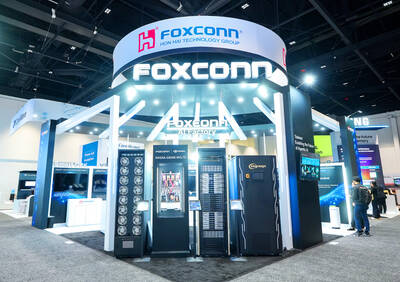Tata Group is set to seal a deal to become India’s first homegrown iPhone maker after Wistron Corp (緯創) yesterday agreed to sell a plant in the southern part of the country to the conglomerate.
Wistron’s board approved the sale of Wistron InfoComm Manufacturing (India) Private Ltd to Tata for US$125 million, the Taiwanese electronics manufacturer said in a statement.
The unit operates an iPhone assembly plant near Bengaluru, a person familiar with the matter said.

Photo: Fang Wei-chieh, Taipei Times
Tata, an airline-to-software conglomerate, has been in talks for more than a year to take over the plant as it seeks to forge closer ties with Apple Inc.
The deal advances India’s efforts to create local contenders to challenge China’s dominance in electronics, which has been jeopardized by political tensions with the US.
Apple’s iPhones are mainly assembled by Taiwanese firms such as Pegatron Corp (和碩) and Hon Hai Precision Industry Co (鴻海精密), which is known as Foxconn Technology Group (富士康科技集團) outside Taiwan.
Wistron is one of three Taiwanese iPhone manufacturers in India, along with Foxconn and Pegatron.
It has sought to diversify its business beyond thin-margin iPhone manufacturing into areas such as servers, agreeing to sell its iPhone production business in China to a competitor in 2020.
After the deal has been confirmed by both parties, the companies would seek regulatory approval, Wistron said.
Tata has taken other steps to increase its business with Apple. It has accelerated hiring in its factory in Hosur, near Bengaluru, where it produces iPhone components.
That plant stands on several hundred hectares of land where Tata could add iPhone manufacturing lines in the next few years.
Tata has also announced that it plans to launch 100 Apple stores in the country of 1.4 billion people.

It was late morning and steam was rising from water tanks atop the colorful, but opaque-windowed, “soapland” sex parlors in a historic Tokyo red-light district. Walking through the narrow streets, camera in hand, was Beniko — a former sex worker who is trying to capture the spirit of the area once known as Yoshiwara through photography. “People often talk about this neighborhood having a ‘bad history,’” said Beniko, who goes by her nickname. “But the truth is that through the years people have lived here, made a life here, sometimes struggled to survive. I want to share that reality.” In its mid-17th to

‘MAKE OR BREAK’: Nvidia shares remain down more than 9 percent, but investors are hoping CEO Jensen Huang’s speech can stave off fears that the sales boom is peaking Shares in Nvidia Corp’s Taiwanese suppliers mostly closed higher yesterday on hopes that the US artificial intelligence (AI) chip designer would showcase next-generation technologies at its annual AI conference slated to open later in the day. The GPU Technology Conference (GTC) in California is to feature developers, engineers, researchers, inventors and information technology professionals, and would focus on AI, computer graphics, data science, machine learning and autonomous machines. The event comes at a make-or-break moment for the firm, as it heads into the next few quarters, with Nvidia CEO Jensen Huang’s (黃仁勳) keynote speech today seen as having the ability to

The battle for artificial intelligence supremacy hinges on microchips, but the semiconductor sector that produces them has a dirty secret: It is a major source of chemicals linked to cancer and other health problems. Global chip sales surged more than 19 percent to about US$628 billion last year, according to the Semiconductor Industry Association, which forecasts double-digit growth again this year. That is adding urgency to reducing the effects of “forever chemicals” — which are also used to make firefighting foam, nonstick pans, raincoats and other everyday items — as are regulators in the US and Europe who are beginning to

NEXT GENERATION: The company also showcased automated machines, including a nursing robot called Nurabot, which is to enter service at a Taichung hospital this year Hon Hai Precision Industry Co (鴻海精密) expects server revenue to exceed its iPhone revenue within two years, with the possibility of achieving this goal as early as this year, chairman Young Liu (劉揚偉) said on Tuesday at Nvidia Corp’s annual technology conference in San Jose, California. AI would be the primary focus this year for the company, also known as Foxconn Technology Group (富士康科技集團), as rapidly advancing AI applications are driving up demand for AI servers, Liu said. The production and shipment of Nvidia’s GB200 chips and the anticipated launch of GB300 chips in the second half of the year would propel